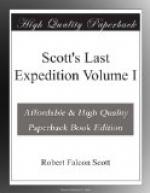We are living extraordinarily well. At dinner last night we had some excellent thick seal soup, very much like thick hare soup; this was followed by an equally tasty seal steak and kidney pie and a fruit jelly. The smell of frying greeted us on awaking this morning, and at breakfast each of us had two of our nutty little Notothenia fish after our bowl of porridge. These little fish have an extraordinarily sweet taste—bread and butter and marmalade finished the meal. At the midday meal we had bread and butter, cheese, and cake, and to-night I smell mutton in the preparation. Under the circumstances it would be difficult to conceive more appetising repasts or a regime which is likely to produce scorbutic symptoms. I cannot think we shall get scurvy.
Nelson lectured to us to-night, giving a very able little elementary sketch of the objects of the biologist. A fact struck one in his explanation of the rates of elimination. Two of the offspring of two parents alone survive, speaking broadly; this the same of the human species or the ‘ling,’ with 24,000,000 eggs in the roe of each female! He talked much of evolution, adaptation, &c. Mendelism became the most debated point of the discussion; the transmission of characters has a wonderful fascination for the human mind. There was also a point striking deep in the debate on Professor Loeb’s experiments with sea urchins; how far had he succeeded in reproducing the species without the male spermatozoa? Not very far, it seemed, when all was said.
A theme for a pen would be the expansion of interest in polar affairs; compare the interests of a winter spent by the old Arctic voyagers with our own, and look into the causes. The aspect of everything changes as our knowledge expands.
The expansion of human interest in rude surroundings may perhaps best be illustrated by comparisons. It will serve to recall such a simple case as the fact that our ancestors applied the terms horrid, frightful, to mountain crags which in our own day are more justly admired as lofty, grand, and beautiful.
The poetic conception of this natural phenomenon has followed not so much an inherent change of sentiment as the intimacy of wider knowledge and the death of superstitious influence. One is much struck by the importance of realising limits.
Saturday, May 27.—A very unpleasant, cold, windy day. Annoyed with the conditions, so did not go out.
In the evening Bowers gave his lecture on sledging diets. He has shown great courage in undertaking the task, great perseverance in unearthing facts from books, and a considerable practical skill in stringing these together. It is a thankless task to search polar literature for dietary facts and still more difficult to attach due weight to varying statements. Some authors omit discussion of this important item altogether, others fail to note alterations made in practice or additions afforded by circumstances, others again forget to describe the nature of various food stuffs.




